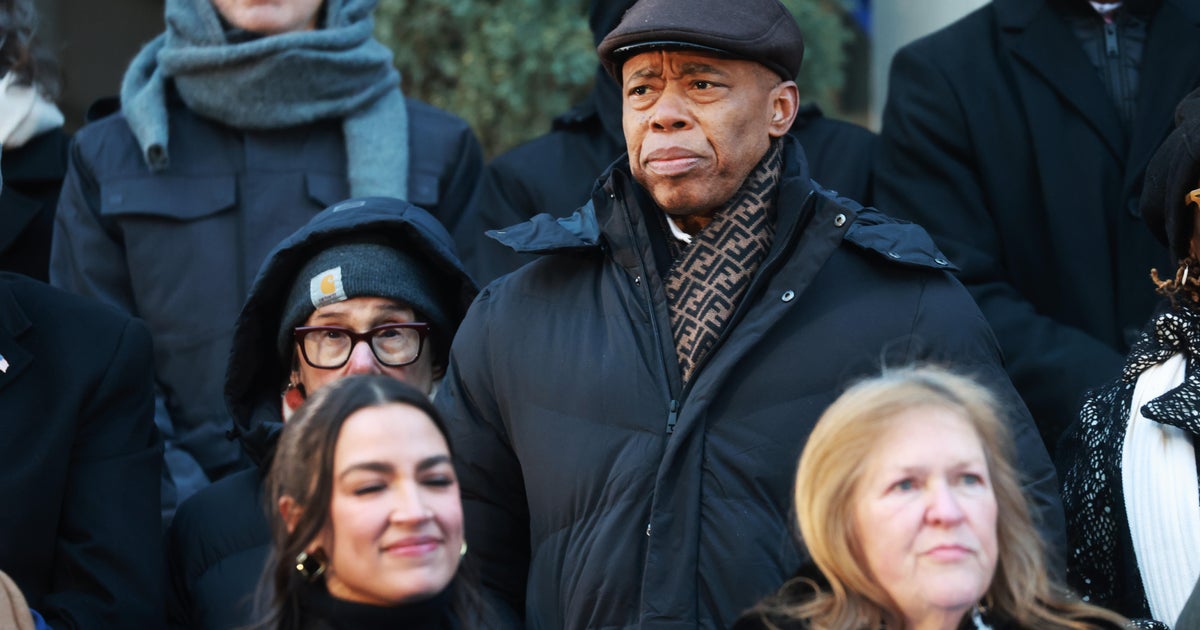Transcript: Miami Mayor Francis Suarez on "Face the Nation," July 24, 2022
The following is a transcript of an interview with Miami Mayor Francis Suarez that aired Sunday, July 24, 2022, on "Face the Nation."
MARGARET BRENNAN: That was Mark Strassman reporting. We turn now to Miami Mayor Francis Suarez. He is a Republican and the current chairman of the US Conference of Mayors. He joins us from Miami. Mr. Mayor, good to have you with us. You just heard our reporting there, you know, in this 2,000 page report the UN put out earlier in the year, it refers to Florida as an example of a place where the impacts of climate change are already being felt. And it mentions people are likely going to have to move away if they live on the coastline. You and your city have had to come up with a strategy and the one released would spend $4 billion- $3.8 billion over the next few decades to build sea walls, take other measures. That's quadruple your annual operating budget. Can- can you afford what's coming?
MAYOR FRANCIS SUAREZ: Well, first of all, Margaret, it's not theoretical for us in the city of Miami, it's real. We deal with it day in and day out year after year, we've been dedicating a tremendous amount of resources, updating our building codes over decades, since 1992, when we had a 200 mile per hour hurricane event called Hurricane Andrew. Now, our latest challenge, of course, is the water and the heat, as you've said in the prior segment, and we- our citizens approved right after Hurricane Irma in 2017, which created a four to six foot storm surge in our central business district, a plan called Miami Forever, and the basis of the plan is to spend hundreds of millions of dollars that were voted approved that was actually a voter approved tax, and combine them with other funding sources like the state and federal government to- to be able to to upgrade our infrastructure to deal with all the things that are being thrown our way from mother nature.
MARGARET BRENNAN: But when you said you can't afford not to take it seriously, I wonder if you think the national Republican Party takes the problem of climate change seriously.
MAYOR SUAREZ: Well, what we're seeing at the national level is that the only action that is occurring is action that's taken in a bipartisan basis, the Democrats, unfortunately, have failed to be able to pass bills to address climate at any sort of scale. So the infrastructure–
MARGARET BRENNAN: –Well, they don't have any Republican votes. They also don't have all Democrats on board, but it would help if they had Republican votes.
MAYOR SUAREZ: Yeah, exactly. Well, I think what it means is that it has to be bipartisan in terms of their outreach in terms of their messaging, in terms of- you know, which is how they pass the, you know, the $1.2 trillion infrastructure bill with- with Republican votes. And we still haven't seen any funding from that bill, by the way. Like I said, we've dedicated $200 million dollars in funding from our city residents.
MARGARET BRENNAN: Why not?
SUAREZ: It's a great question. You know, they have a great infrastructure czar, which is a former mayor of New Orleans, who was the president of the US Conference of Mayors who we work with, but we still have not seen a penny of that money trickle down, percolate down to the cities. And we need it because, as I've said, we've dedicated a couple of $100 million dollars. Yeah, we've gotten about 30 or 40 million from the state. But we need significantly more than that, as you've indicated in your initial comments.
MARGARET BRENNAN: So there was this $2 trillion American Rescue Plan that passed back in the spring with zero republican votes. Florida did benefit. Republican governor DeSantis allocated over 400 million to help coastal communities in Florida. So have you gotten that money in your hand? And how much more do you need exactly?
MAYOR SUAREZ: Yes, we have actually the American Rescue Plan, ARPA, as you- as you describes it, it's coming in two tranches, $950 billion last year, $950 billion this year, and we have allocated effectively. And we are trying to leverage the money that we have to do things like, you know, increasing our sea walls, of valves- tidal valves that prevent the backflow of water into our city, during- during storm events, pump stations, which we have built more and more and are planning to build significantly more. So, we are addressing the issue head on. And certainly, the funding that- that we're going to be receiving from the state and from the federal government, hopefully eventually from the infrastructure bill, is critically needed for us to be able to tackle this problem and make sure that we have Miami forever.
MARGARET BRENNAN: We mentioned you are a registered Republican, mayor of the second largest city in Florida, when you were on this program. Last back in January, you told me that you had repeatedly reached out to your governor, fellow Republican, to talk to him about health precautions you want to take in Miami, but you had no contact, no outreach. And I wonder what you think that says about Ron DeSantis's executive leadership in a time of crisis.
MAYOR SUAREZ: You know, we are different. We have different perspectives and different personalities and different philosophies in terms of- of our leadership style. You know, we you know, I- I lead, like you said the largest, arguably the largest urban city in the state. And his mandate is significantly greater in terms of number, but it's also very different in terms of cities and rural areas, you know, so-
MARGARET BRENNAN: Does he talk to you now? Does he talk to the mayor of the second largest city in the state?
MAYOR SUAREZ: We do. We have spoken on a variety of occasions. In fact, one of the ones that we spoke about recently happened to be about resiliency. We actually, the state did give us about $40 million that we combined with a $200 million and we did a press conference together in Broward County. So, on- on the environment, I have to say his record over the last four years, including the legislature's record, has been very much pro-environment and something that he and I share.
MARGARET BRENNAN: What about on issues of health? I mean, when it comes to COVID, Florida's response has been heavily scrutinized. Monkeypox right now, Florida has the third highest case count of any state in the country. Are you, in Miami, getting the vaccine's you need? Are you getting the testing you need? Has that part of the health rollout, working with the state been smooth?
MAYOR SUAREZ: You know, we're monitoring this outbreak. As you mentioned, I am not aware of any shortages in vaccines, or testing at this particular juncture, none of it has been, you know, come to my attention, but certainly will work with the state and certainly will work with the federal government to make sure that our city is protected and that those here get the necessary testing and vaccination and to protect themselves against the monkeypox virus.
MARGARET BRENNAN: Alright, Mayor Suarez, thank you for your time today. And we'll be right back.



